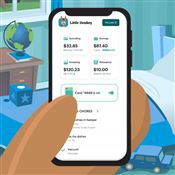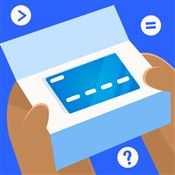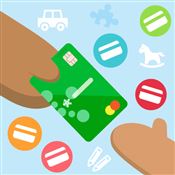Best Prepaid Cards for Kids
Which prepaid debit card is best for your child? Compare the pros, cons, and cost of the top prepaid cards for kids.
All Ages - Banking and Invest in One App
- Flexible controls, spending notifications, in-app chore list
- Age: No minimum age
- Fees: Starts at $5.99/month, per family (up to 5 kids). $10.98/month for Greenlight Max. $15.98/month for Greenlight Infinity. $24.98/month for Greenlight Family Shield.
Acorns Early Kids' Debit Card
- Real-time spend notifications.
- Block and unblock cards easily.
- Teach financial independence safely.
 |
- Best for Under 13: Greenlight
- Best Educational Content: Acorns Early (formerly GoHenry)
- No Overdraft Fees: Chase First Banking
- Best Money Tools: FamZoo
- Best for Large Families: BusyKid
- Best Prepaid Card for Teenagers: Current
- Best for Over 18: American Express Serve
- Best Rewards Program: Jassby
- Best Virtual Debit Card: Mazoola
Teaching kids about financial responsibility isn't easy. But, if you want to set them on the right path toward financial literacy, it helps to start young.
With a prepaid debit card, your child can learn to manage money and build good financial habits for life.
Below, check out the best prepaid cards for kids and teens and see which prepaid cards are worth it. Plus, learn how to choose the best card for your family's needs.
Step Visa Card for Teens
- Building credit is safe and easy with the Step secured Visa card
- Step Black members earn 3.00% on savings and up to 10% cashback on purchases
- No interest, no security deposit and no credit check
Best Prepaid Cards for Kids and Teenagers
 |
Financial responsibility doesn't happen overnight. Check out the top prepaid debit cards to give your kid a head start.
| Prepaid Card | Age | Monthly Fees | Best For | Learn More |
|---|---|---|---|---|
| Greenlight | No minimum | $5.99, $9.98, or $14.98/mo. | Investing and robust parental controls | Visit Site |
| Acorns Early | 6+ years old | $5 or $10/mo. | Fun, educational game | Visit Site |
| Chase First Banking | 6-17 years old | $0/mo. | No overdraft fees | Read Review |
| FamZoo | No minimum | $5.99/mo. | Financial tools for mature kids | Visit Site |
| BusyKid | 5+ years old | $4 per month (billed annually at $48) | Chores and allowance management | Visit Site |
| Current | 6+ years old | $0/mo. | Basic banking for teens | Visit Site |
| American Express Serve | 18+ years old | $0, $6.95, or $7.95/mo. | Prepaid card with perks | Visit Site |
| Jassby | No minimum | $5.95/mo. | Rewards program | Visit Site |
| Mazoola | No minimum | $0/mo. | Virtual debit card | Visit Site |
The SECURE rule helps parents remember the key aspects to consider when choosing a prepaid card for their kids:
- Security: Choose a card with strong security features to protect your child's information.
- Education: Look for cards that offer educational tools to teach kids about money management.
- Control: Set daily spending limits to manage and control spending.
- Usability: Ensure the card is easy to use for both kids and parents.
- Rewards: Look for features like parental controls, spending alerts, and budgeting tools.
- Ease of access: Make sure the card is easy to use for both kids and parents.
Best for Under 13: Greenlight
| Monthly Fees | $5.99, $9.98, or $14.98/mo. |
|---|---|
| Age | No minimum |
| Minimum to Open | $1 with bank transfer or $20 with debit card |
| Daily Transaction Limits | $1,500 debit, $100 ATM |
| Key Features | Mastercard debit card, educational content, investment account, high-interest savings, cash back, chores, allowance, charity donations, parental controls, identity theft protection |
Greenlight is a prepaid debit card and banking app that covers all your bases. The platform has tons of features designed to teach kids responsible money management, including educational content, investing, and high-interest savings.
But it does cost a bit more than some of its competitors.
- Greenlight Core ($5.99/mo.): Includes kids' debit card, basic banking, educational content, parental controls, financial literacy games, credit card for parents, investing for parents with limited features, and 2% savings reward.
- Greenlight Max ($9.98/mo.): Adds an investing platform and research tools for kids and parents, priority customer support, protection plans, cash back on purchases, and 3% savings reward.
- Greenlight Infinity ($14.98/mo.): Adds family location sharing, crash detection, SOS alert, cash back, and 5% savings reward.
The fee covers up to five kids and prepaid debit cards per family. Even though the monthly fee is relatively high, the price is reasonable if you need a card for multiple children.
Overall, Greenlight is a fantastic product if you want to give your kids a solid personal finance foundation.
Pros + Cons
|
|
Other Fees[1]
- Card Replacement: $3.50 (first replacement free)
- Expedited Card Delivery: $24.99
- Custom Card Fee: $9.99
Best Educational Content: Acorns Early (formerly GoHenry)
| Monthly Fees | $5/mo. per kid; $10/mo. per family (up to 4 kids) |
|---|---|
| Age | 6+ years old |
| Minimum to Open | $5 |
| Daily Transaction Limits | $2,500 debit, $120 ATM |
| Key Features | Mastercard debit card, educational games, chores, allowance, parental controls |
Acorns Early (formerly GoHenry) offers a slightly different take on financial education by presenting it in the form of a fun game. Kids and teens can complete missions to earn points and level up. The money lessons cover topics like investing, saving, and entrepreneurship.
The Acorns Early debit card is good if you need robust parental controls over your kid's account. Parents can control where and how much kids can spend. You can easily lock and unlock the debit card through the parent app as well. Spending alerts also let you keep tabs on your kid in real time.
There's also the option to customize your prepaid card for a one-time fee of $5. There are more than 35 card designs to choose from. Plus, the Acorns Early logo in the upper left of the card gets customized with your child's name.
Acorns Early offers a monthly plan for the individual child and an affordable family plan. The family plan covers up to 4 children. If you have multiple kids, this could be a better deal. Plus, it's a good option if you want a fun game to teach your kids about personal finance.
Pros + Cons
|
|
Other Fees
- ATM Fee: Free
- Card Replacement (same design): Free
- Card Replacement (different design): $5
- Custom Card Fee: $5
Acorns Early Kids' Debit Card
- Real-time spend notifications.
- Block and unblock cards easily.
- Teach financial independence safely.
No Overdraft Fees: Chase First Banking
| Monthly Fees | $0 |
|---|---|
| Age | 6-17 years old |
| Minimum to Open | $0 |
| Daily Transaction Limits | $400 debit, $100 ATM |
| Key Features | Visa debit card, savings goals, chores, allowance, Chase ATM access, parental controls |
Chase First Banking is a free debit card that makes it easy for kids to save money and spend money. Your child can access make online purchases, shop in store, or use more than 15,000 Chase ATMs and 4,700 Chase branches. Plus, the card can be used anywhere Visa is accepted.
The Chase First Banking app is powered by Greenlight, a popular paid banking platform for kids. The apps share some similar features. This includes chores, allowance, robust parental controls, and savings goals.
There is a catch to this solid free debit card—it's not available to everyone. Parents can only make an account if they have a Chase checking account. You'll need to link your Chase checking account to your kid's account to make deposits.
Overall, it's still a great choice for a free, full-featured debit card with no monthly fees or overdraft fees.
Other Fees[2]
- Out-of-Network ATM Fee: $3 fee per withdrawal at a non-Chase ATM in the U.S. and the U.S. territories. $5 fee per withdrawal at a non-Chase ATM outside of the U.S. and the U.S. territories. Surcharge Fees from the ATM owner/network still apply. U.S. territories include American Samoa, Guam, the Northern Mariana Islands, Puerto Rico and the U.S. Virgin Islands.
- Foreign Transaction Fee: 3%
- Card Replacement: Free (standard shipping); $5 (express shipping)
- Expedited Card Delivery: $5
Best Money Tools: FamZoo
| Monthly Fees | $5.99/mo. |
|---|---|
| Age | No minimum |
| Minimum to Open | $5 |
| Daily Transaction Limits | $5,000 debit, $510 ATM |
| Key Features | Mastercard debit card, subaccounts, parent-paid interest, family billing, informal loans, chores, allowances, parental controls |
FamZoo is a prepaid card that offers some unique features to help families teach money management skills. Although the app doesn't offer educational content, it does offer tools for spending, saving, and budgeting money.
One interesting feature is informal loans. You can lend your child money and have them pay you back with interest. You can also pay interest on your kid's savings, similar to a high-interest savings account.
For both features, you set the interest amount yourself. This is a great opportunity to teach your kids about compound interest. You can bump up the interest rate to really drive home how quickly interest can add up.
Some of FamZoo's features require some background knowledge about handling money. So, it's great for older kids and teens.
Pros + Cons
|
|
Other Fees[3]
- Additional Card Fee: $3.00 (first 4 cards free)
- Card Replacement: $3.00 (first 2 replacements free)
- Expedited Card Delivery: $25
- Cash Reload Fee: Up to $4.95
FamZoo Prepaid Card for Kids and Teens
- Order Online
- No Credit Check
- Try for Free
Best for Large Families: BusyKid
| Monthly Fees | $4/mo. (billed annually at $48) |
|---|---|
| Age | 5+ years old |
| Minimum to Open | $0 |
| Daily Transaction Limits | $2,000 debit, $810 ATM |
| Key Features | Visa debit card, chores, allowance, savings, donate to charity, investment account, parental controls |
BusyKid is great if you want a debit card for multiple children. The account offers prepaid cards for up to five kids for each family, all for a single fee of $4 per month (billed annually at $48). It offers a streamlined way to manage all your kids' chores and allowance payments.
The app allows you to easily assign chores and allowance amounts for each completed task. You don't have to juggle multiple task lists or keep track of cash allowances.
The parental controls are little lacking with BusyKid. Parental approval is required whenever your kid wants to transfer money from savings to spending. But there's no way to set spending limits for certain stores or categories.
If you need a prepaid card for multiple kids, BusyKid is a very cost-effective option. It's great if you have younger kids who earn an allowance by completing chores.
Pros + Cons
|
|
Other Fees[4]
- Declined Purchase Fee: $0.50
- Foreign Currency Conversion: 3%
- Foreign Transaction Fee: $2.50
- Card Replacement: $5
- ATM Fee: $1.50
Best Prepaid Card for Teenagers: Current
| Monthly Fees | $0 |
|---|---|
| Age | 13+ years old |
| Minimum to Open | $0 |
| Daily Transaction Limits | $2,000 debit, $500 ATM |
| Key Features | Visa debit card, savings goals, round-ups, chores, allowance, charity donation, parental controls |
Current Teen Banking is another prepaid card for teens age 13 and older. The account helps teens spend, save, earn, and even donate money to charity. This prepaid debit card is also good for co-parenting because it lets multiple family members add funds.
Current offers multiple features that encourage teens to save, including customizable savings goals. There's also a round-up feature to help teens save more often. Each time you make a transaction, the amount is rounded to the nearest dollar. The difference is put directly into savings.
The parental controls are quite flexible. Parents can set spending limits, block certain merchants, and get account alerts. You can give your child as much freedom as you feel comfortable with.
Current is a good choice for teenagers who need a streamlined app that does a little bit of everything.
Pros + Cons
|
|
Other Fees[5]
- Out-of-Network ATM Fee: $2.50
- International ATM Fee: $3 + 3%
- Foreign Transaction Fee: 3%
- Card Replacement: $5
Convenient Teen Account With Debit Card
- Easy transfers, set spending limits, automate allowances
- Age: 13 years and older
- Fees: No monthly or annual fee
Best for Over 18: American Express Serve
| Monthly Fees | $0, $6.95, or $7.95/mo. |
|---|---|
| Age | 18+ years old |
| Minimum to Open | $0 |
| Daily Transaction Limits | $15,000/mo. debit, $750/day ATM |
| Key Features | American Express debit card, early direct deposit, easy cash reload |
American Express Serve offers four different prepaid debit cards with slightly different features. You must be at least 18 years old to open an account. But it's a good option if you're searching for a prepaid card for your adult children.
Here are the perks you'll get with each Serve card:
- The Free Reloads card has a monthly fee of $6.95. It offers free cash reloads at more than 45,000 locations.
- The 1% Cash Back card has a monthly fee of $7.95. It allows you to earn 1% cash back on your purchases.
- The Free Direct Deposit card has a monthly fee of $6.95 which can be waived if you have $500 in direct deposit each month.
- The Pay As You Go card has a $0 monthly fee, but charges fees for all ATM withdrawals.
You can get all four prepaid cards for free online. If you purchase any of the cards in stores, it'll cost you $1.50 for each card.
All four cards come with early direct deposit and a mobile app. The app is quite simple. It doesn't offer extra features like chores and allowance payments that you might find in products geared toward kids.
Pros + Cons
|
|
Other Fees[6]
- ATM Fee: $0 (in-network); up to $2.50 (out-of-network)
- Card Replacement: $5 (standard shipping); $20 (expedited shipping)
- Cash Reload: $3.95
Best Rewards Program: Jassby
| Monthly Fees | $5.95/mo. |
|---|---|
| Age | No minimum |
| Minimum to Open | $0 |
| Daily Transaction Limits | $1,000 debit |
| Key Features | Digital and physical debit card, rewards/shopping program, chores, allowance, parental controls |
Jassby is a unique take on a prepaid debit card for kids and teens. It's available as a digital card and a physical card. If you live in a small city where contactless payments are not widely accepted, you might want to request a physical debit card for your kids.
The Jassby app encourages teens to make good financial decisions. Good decisions increase your Financial Literacy Score, which earns higher rewards. Rewards can be redeemed for products and gift cards from Apple, Starbucks, Target, and more.
Parents can set spending limits through the app and get account alerts. You can also set limits on what your kid can buy in the Jassby store.
If you're interested in a rewards program to encourage your kid to learn about money, the Jassby debit card can be a good option. Just keep in mind that users cannot make ATM cash withdrawals or deposits with Jassby debit card.
Pros + Cons
|
|
Other Fees
- Card Replacement: $4.95 (+ applicable tax)
- Funding with external debit card: Free
Best Virtual Debit Card: Mazoola
| Monthly Fees | $0/mo. |
|---|---|
| Age | No minimum |
| Minimum to Open | $0 |
| Daily Transaction Limits | $3,000 debit |
| Key Features | Virtual prepaid debit card, chores, allowance, parental controls |
The Mazoola virtual debit card can be used for online purchases or in-store. The card can only be used in-store if it's linked to Google Pay or Apple Pay. This could limit where you're able to use the debit card.
Parents can set up money transfers for completed chores or as a reward for good behavior. Within the app, your kid can set up personal goals and fundraising goals for charities.
Mazoola is COPPA compliant[7], which helps protect your child's privacy online. The platform takes privacy and security seriously. The platform is certified by a third-party company to stick to COPPA guidelines. There's also a lower risk of your kid's debit card falling into the wrong hands since it's a virtual debit card.
Funding options are limited with the Mazoola virtual debit card. Parents can transfer money from their bank account. But it doesn't offer cash, check, or direct deposits. There's also no ATM access, which can be an issue if your kid needs to withdraw cash.
Pros + Cons
|
|
Other Fees
- None
Can I Get a Debit Card for Kids Under 13?
There are many debit cards for kids and teenagers. No matter how young your child is, there will be an option available for you.
To open your own bank account, you must legally be an adult. In most states, this means you must be 18 years old. In Alabama and Nebraska, you must be at least 19 years old. But if a parent or guardian opens a bank account, kids can have their own debit card at a younger age.
Most banks require kids to be at least 13 years old to have a joint checking account and debit card. If your kid is younger than 13, a prepaid card is a great alternative.
The age limit for a prepaid debit card is typically much lower. Kids as young as 6 years old can have their own prepaid card. Many prepaid debit cards for kids have no minimum age requirements.
Debit Cards vs. Prepaid Cards
Debit cards and prepaid cards function similarly. Both offer easy access to your money without fussing with cash. But there are a few differences, and the best choice for you depends on what you're looking for.
Here are some of the main differences between debit cards and prepaid cards:
Debit cards
A regular debit card is connected to a checking account at a bank or credit union. When you make a purchase using a debit card, it pulls money directly from your bank account.
Regular debit cards typically allow parents to monitor their kid's account, but they offer fewer control options. Most accounts for kids seamlessly convert to adult checking accounts once the child is of age.
This is a good choice for older kids who are mature enough to manage their own spending.
Prepaid cards
A prepaid card, on the other hand, needs to be loaded with funds before you use it. It's considered a stored-value card because money is linked to the card itself, not an external account.
Prepaid cards usually have lower age requirements compared to traditional debit cards. Many prepaid debit cards for kids also offer more robust parental controls.
This makes them best suited for younger children.
Pros and Cons of Prepaid Debit Cards
 |
Pros
- Get head start on personal finance education. Kids start forming financial habits from a very young age. It's best to get them on the right track as soon as possible. Many prepaid debit cards for kids have educational apps which can set your children up for success.
- More secure than cash. Cash can easily be lost or stolen. With a prepaid debit card, you can freeze the card as soon as you realize it's missing. This will prevent your money from getting into the wrong hands. Plus, it's more convenient to use in store. You don't have to count cash at the register.
- Lower age limits. Compared to a regular debit card for kids, a prepaid card usually has low minimum age requirements, or none at all. As long as there's a parent or guardian, even very young kids can get their own prepaid card.
- Get real-world experience with money. Kids learn best by doing. A prepaid debit card allows children to manage their own money. It does wonders to help kids feel more confident with their finances.
- Get a head start on investing. Some prepaid debit cards for kids offer investment services through the mobile app. When it comes to investing, it's best to start as early as possible. The right platform can help kids get started buying fractional shares of stocks.
- Easily keep tabs on your kids. If your kid is still pretty young, you'll most likely want to keep an eye on their spending. Many prepaid debit cards offer customizable parental controls. You could set spending limits, block merchants, and get account alerts for all spending activity.
- Can't incur debt. Because a prepaid card needs to be loaded before you use it, there's no risk of getting into debt. You can only spend the amount that's currently on your card. It also means your account can't be overdrafted.
Cons
- Can be inconvenient to load cash. To add cash to the card, you may be able to bring it to a retail store location. However, this usually costs money, about $3 to $5 each time you reload cash.
Other cards don't allow you to load cash at all. If you need to deposit cash, be sure to check if your prepaid debit card supports cash deposits.
- Account fees. While there are free prepaid debit cards, many have a higher monthly fee than regular debit cards. You also need to watch out for other miscellaneous fees like ATM fees and cash reload fees.
These extra fees could make your prepaid card more expensive than you expect. It's a good idea to understand all the account fees before you open a card.
- Easy to spend money. Prepaid debit cards make it a lot easier to access your money. This could be a good or a bad thing. If your kid isn't ready to spend responsibly, a card probably isn't a great idea just yet. But keep in mind that most apps come with flexible parental controls.
You can adjust how much freedom your child has, at least until they're able to manage money more independently.
- Doesn't build credit. Since your prepaid card is not a credit card, it won't contribute to your credit history. Activity on your prepaid card is not reported to any of the credit bureaus.
How to Choose the Best Prepaid Card for Kids
There are lots of prepaid debit cards for kids on the market with different price points. Take some time to determine which features are most important to you. You'll be able to pick a card once you know what you're looking for.
Here are some important factors to consider in a prepaid card for kids:
Pricing and Fees
Many prepaid cards charge a monthly service fee, which may cover just one child, or up to 5 children at once. Keep this in mind while you're comparing prices, especially if you need a prepaid card for multiple kids.
Even if there's no monthly fee, you may run into ATM fees or cash reload fees. Every card is different, so be sure to understand all the fees before you open an account.
Parental Controls
How much freedom do you want to give to your kid? Most prepaid cards allow parents to at least monitor spending and get account alerts. But some cards go even further with customizable spending limits. These allow you to limit how much and where your kid spends.
Budgeting and Savings Tools
Prepaid cards can help your kid get in the habit of saving and budgeting. Many prepaid debit card apps offer features like savings goals. This can encourage kids to set their own financial goals and work toward them.
Educational Content
Debit cards with educational apps help kids get up to speed with important personal finance topics. In-app content usually includes short videos, articles, and quizzes to keep kids engaged. This is an easy way for kids to learn about spending, saving, investing, and more.
Chores and Allowance
This feature allows kids to earn an allowance by completing chores assigned through the app. You can set a dollar amount for each chore. Once your kid marks a task as complete and you approve it, money is automatically transferred to your kid's account.
It makes allowances a lot more streamlined, especially if you have multiple kids and chore lists.
Investment Account
Some prepaid debit cards for kids offer investment services through the app. And what better way to learn about investing than by actually doing it? Most built-in investing services offer fractional shares so your kid can start investing with little money.
How to Open a Prepaid Card for Your Child
The process to open a prepaid debit card for your kid is similar to opening a regular checking account. You can sign up for an account online, and it shouldn't take very long.
Before you start, be sure to have your personal information handy. Here's what you might need to open your account:
- Full name
- Phone number
- Email
- Address
- Date of birth
- Social Security number
- Driver's license
- Your child's information
You might not need to provide as much information about your child. But be prepared to provide your own personal details.
Each company will have slightly different processes to get a prepaid debit card for your kid. But here's a rough idea of what you need to do to open an account for your child:
- Go to the company's website or download the app.
- Click sign up to create an account.
- Fill out form with your personal information and your kid's information.
- Confirm your details.
- Select and order your debit cards.
- Receive your card in the mail in about a week.
Some companies offer expedited shipping if you need your card in a rush. The fee could be $25 or more, so it can be pricy. Try to plan ahead to avoid the rush shipping fee.
Many prepaid debit cards for kids are also available digitally before your physical card arrives. You can add your card to Apple Pay or Google Pay while you wait for your physical card to get to you.
Frequently Asked Questions
 |
Can my 11-year-old have a debit card?
In general, checking accounts offered by banks and credit unions have a minimum age requirement of 13 years old. A parent or guardian can open a joint checking account with their child at this age.
For kids younger than 13, a prepaid debit card is better since the age limits are typically lower. Some prepaid debit cards for kids have no minimum age requirement. Your child can get a head start even earlier if you go this route.
What kind of accounts can I open for my kid?
There is a range of bank accounts and investment accounts you can open for your kid. These include:
Prepaid Card
This is one of the most flexible account types for kids and teens. It's available for young age groups and usually comes with an educational app. If your kid needs more guidance before being thrust into the real world of finances, this is a great introduction to money.
Checking
These accounts come with a debit card that lets your kid access money in their bank account. It's great for teens who have a job and need to deposit paychecks. You can't spend more than you have in the account. But you may have to pay an overdraft fee if your bank charges it.
Savings
Savings accounts are for money your child doesn't need right away. It separates savings from spending money while still being easily accessible. Some savings accounts earn interest to help boost your savings a little faster.
Other accounts may have the option for parents to pay interest themselves. This is a great opportunity to teach your child about compound interest.
Custodial Account
Uniform Gift to Minors Act (UGMA) and Uniform Transfer to Minor Act (UTMA) accounts let parents invest on behalf of their kids. Parents can deposit and withdraw money as long as it's for their kid's benefit. There are no contribution limits or income limits.
Educational Account
Coverdell education savings accounts and 529 plans are designed to help parents save and invest in their kid's education. Funds in these accounts can only be used for your kid's education only. A 529 plan is tax-advantaged, similar to an IRA.
Credit Card
While a child can't open their own credit card, parents can add them as an authorized user. This will give your child their own credit card to use and build credit. Just make sure your child understands not to overspend.
Are debit cards for kids safe?
It's always a good practice to do some research on a debit card's safety before you commit. When it comes to opening an account for your kid, it's all the more important. Look for debit cards with these important features to keep your kid and your money safe:
FDIC or NCUA Insurance
Be sure any banking services you sign up for are insured by the FDIC or NCUA.
The FDIC is a government agency that protects your bank deposits up to $250,000. In case the bank fails, your money will be protected. The NCUA offers the same protection for credit union accounts.[8][9]
COPPA Compliance
COPPA, the Children's Online Privacy Protection Act, requires apps for children to disclose what data is collected. Take a look at each app's privacy policy. They should clearly detail the personal data they collect and how they use your kid's data.
Parental Controls
Most kids debit cards will have some sort of parental controls in place. This could include spending limits and blocking kids from spending money at certain stores.
Some accounts, on the other hand, are much more lax with their parental controls. There are apps that require parental approval for every money transfer, but don't offer spending limits. Decide how much flexibility and control you want, then choose an account that fits your needs.
Account Security
Financial apps should have multiple security measures in place to keep your sensitive information safe. Features like two-factor authentication, SSL encryption, and automatic logout usually come standard to protect your account.
Some debit cards for kids offer additional features like identity theft protection.
Can my kid get a Chime card?
Chime is an app with a free debit card, checking, and savings account. You need to be 18 years or older to open an account. If your child is over 18, they can open an account online. Otherwise, your kid will just have to borrow your Chime card.
Chime doesn't currently offer joint accounts or secondary cards, so you can't add a child to your account. But the company has said they're planning to add this feature in the future.
Bottom Line
It's unrealistic to expect your kid to only use cash or to constantly borrow your card. A prepaid card for kids is a great way to help your child become more confident with money.
Ask yourself what you need a prepaid debit card to do for your family. Do you need a card that teaches your kid how to handle money? Look for a card that offers in-app educational tools. Want to be able to limit how much your kid spends? A card with flexible parental controls can give you peace of mind.
All Ages - Banking and Invest in One App
- Flexible controls, spending notifications, in-app chore list
- Age: No minimum age
- Fees: Starts at $5.99/month, per family (up to 5 kids). $10.98/month for Greenlight Max. $15.98/month for Greenlight Infinity. $24.98/month for Greenlight Family Shield.
Convenient Teen Account With Debit Card
- Easy transfers, set spending limits, automate allowances
- Age: 13 years and older
- Fees: No monthly or annual fee
FamZoo Prepaid Card for Kids and Teens
- Order Online
- No Credit Check
- Try for Free
Acorns Early Kids' Debit Card
- Real-time spend notifications.
- Block and unblock cards easily.
- Teach financial independence safely.
No matter which prepaid debit card you choose, it's an important first step for your kid. Your child will learn healthy financial habits that last a lifetime.
References
- ^ Greenlight. List of all fees for Greenlight Mastercard Prepaid Card, Retrieved 5/14/2022
- ^ Chase. Additional Banking Services and Fees: Deposit Account Agreement - Fee Schedule, Retrieved 5/14/2022
- ^ FamZoo. Fee Disclosures, Retrieved 5/14/2022
- ^ BusyKid. Fees Schedule and Transactions Limits, Retrieved 1/31/2024
- ^ Current. Deposit Account Agreement: Fee Schedule, Retrieved 5/14/2022
- ^ Serve. Serve Direct Deposit Short Form Disclosure, Retrieved 5/14/2022
- ^ Mazoola. "Is Mazoola secure?", Retrieved 1/31/2024
- ^ FDIC. Your Insured Deposits, Retrieved 5/14/2022
- ^ NCUA. How Your Accounts are Federally Insured, Retrieved 5/14/2022
Donna Tang is a content associate at CreditDonkey, a credit card comparison and reviews website. Write to Donna Tang at donna.tang@creditdonkey.com. Follow us on Twitter and Facebook for our latest posts.
Note: This website is made possible through financial relationships with some of the products and services mentioned on this site. We may receive compensation if you shop through links in our content. You do not have to use our links, but you help support CreditDonkey if you do.
|
|
| ||||||
|
|
|













